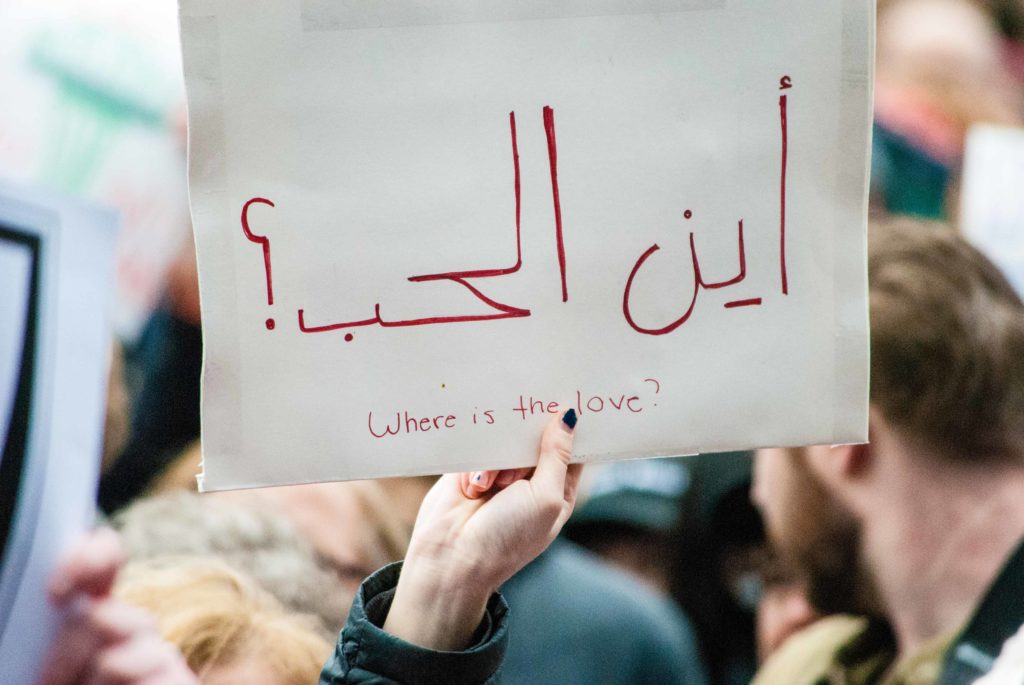Updated at 3:05 p.m. on Feb. 5.
By Alejandro Serrano, deputy campus editor
Two hundred and fifty Northeastern students and 31 faculty and staff members are potentially affected by President Donald J. Trump’s recent executive order barring entry to the U.S. for immigrants and travelers from seven Muslim-majority countries, according to a university spokesperson.
Trump signed the executive order Friday, Jan. 27, banning citizens of Iraq, Syria, Iran, Sudan, Libya, Somalia and Yemen for 90 days, according to the order. The university is not aware of any students, faculty or staff who are stuck abroad, university spokesperson Matthew McDonald said in an e-mail to The News.
Several Northeastern students have already seen an impact on their family and friends. Second-year master’s degree candidate Borna, who asked his last name not be used, said his friend, an Iranian citizen, was in the process of acquiring a visa. After the executive order was signed, his friend’s visa status became “refused,” Borna said.
A leader in Northeastern’s Iranian community, Borna said he doesn’t know how to comfort, let alone help, his friend who is a chemical engineering Ph.D. candidate, with one semester left in her studies, at a university in New York.
“Getting visas was already problematic for us, but with this new thing, things got even worse,” he said.
Borna and other members of the Iranian Students Association of Northeastern (ISAN) who spoke to The News said the rollout of the order has been particularly annoying. When they have sought help, they heard different answers from different people – culminating in frustration and confusion.
International affairs visiting lecturer Emely Cury Tohma said she believes the executive order impacts everyone in the Northeastern community because of the university’s broad diversity.
“My classrooms thrive on the discussions that students bring in from a variety of places in the U.S. and all over the world, and the idea that now students – on top of everything else they have to worry about – will need to worry about if they can go back home and visit their family,” she said. “If they leave the country, are they going to be allowed to reenter? This really has tremendous consequences.”

Northeastern prides itself as a global university with more than 7,000 international students and scholars, according to its international admissions website.
In a Jan. 28 e-mail to the Northeastern community, President Joseph E. Aoun emphasized the administration’s commitment to inclusivity and said the university had reached out to those potentially targeted
“While this situation is fluid and uncertain, let us be certain about our commitment to each other,” Aoun said. “Let us strengthen our resolve to be a welcoming community that embraces the immeasurable benefits of diversity and inclusion.”
Other university administrations around the U.S. have sent similar messages to their students. Although Aoun’s letter did not specify what measures the university can take to protect its international students, it affirmed a commitment to the security of all its students.
“We, the leadership of the university, stand with you and will pursue every means available to safeguard each of you – students, faculty and staff,” Aoun said.
McDonald did not specify what measures can be taken to ensure student safety by press time. Aoun’s letter mentioned resources available to international students, such as the office of global affairs, the office of general counsel and WeCare, a student support system.
Tohma was once an international student from Chile with two Syrian parents and her husband was a Syrian immigrant. Although she and her husband are now both permanent U.S. residents, they cancelled travel plans next month, as Tohma was afraid her husband would not be allowed back into the country as green card holder with a Syrian passport.
Trump tweeted Tuesday morning that the executive order, which also banned Syrian refugees from entering the country for an indefinite amount of time, was designed to protect the U.S.
“Everybody is arguing whether or not it is a BAN,” he tweeted. “Call it what you want, it is about keeping bad people (with bad intentions) out of the country!”
Since Friday, people have used Facebook groups to talk about and cope with issues they are coming across. Groups which connected international students since before the order, have been flooded with discussion of the executive order.
Thousands across the country have taken to the streets and airports to protest the executive order in the days following the order, but Borna said conversation can be more powerful than himself protesting.
“The thing that we can do is inform people as much as we can,” Borna said. “Personally, I believe that me going to protest doesn’t make sense. We are the ones that are affected by this law. We are just nonimmigrants [with] visas. Basically, the people can change the situation – the ones who have rights in this country – and we want them to stand for us.”
Sophie Cannon contributed to this report. Photo by Lauren Scornavacca. Map by Logan Meyer.















